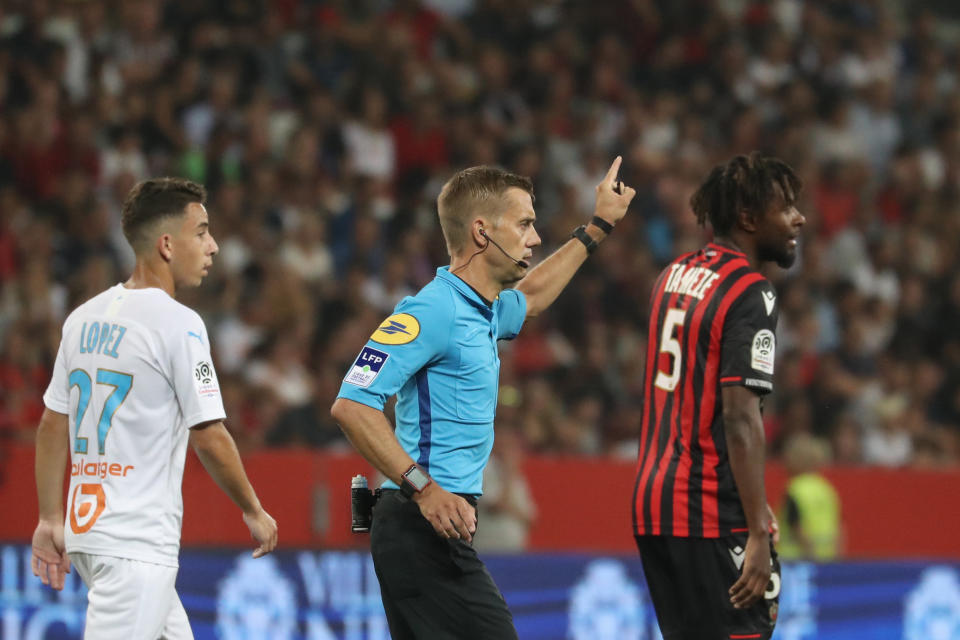Why USMNT-Mexico friendly is a golden opportunity to crack down on anti-gay chant

The United States men’s national team and Mexico will play a soccer game on Friday. Its outcome, in the grand scheme of their rivalry, and in the shadow of their meeting two months prior, will feel relatively insignificant.
It won’t be meaningless. It will be intriguing. But consequential?
Not exactly.
So what better occasion to do something both consequential and necessary than Friday night’s friendly at MetLife Stadium?
It is the perfect opportunity to crack down on the infamous “p***” chant. CONCACAF and Mexico’s soccer federation (FMF) have been unwilling. U.S Soccer, as the host of Friday’s match, is positioned to do so.
According to sources, there have been discussions within the federation, and with other involved parties, about addressing the chant. Whether that means a PA warning (likely), and/or match stoppages (possible), and/or alternative options remains to be seen. As of Thursday morning, no final decisions had been made.
For those unfamiliar with the chant, it has plagued Mexican national team games throughout the decade. Fans often greet opposing goal kicks with the word, which has several meanings, one of which is homophobic. It translates roughly to “male prostitute,” or more explicitly to “f**.”
[ Follow Yahoo Soccer on Twitter and Facebook ]
Some partakers argue it is misunderstood – that their intent has nothing to do with homosexuality. But gay fans feel otherwise. LGBT groups have condemned the chant. FIFA has ruled that it is homophobic. FARE, an anti-discrimination group, has explained that the word refers “to gay men in a derogatory way.”
That it should be policed, therefore, for the sake of inclusivity, is inarguable.
FIFA, however, is the only governing body that has addressed it in a meaningful way. To say it is not a priority for FMF would be a gross understatement. CONCACAF, content to rake in profits, hid behind an ineffective and borderline irrelevant “educational” campaign at the Gold Cup. Inaction has allowed the problem to swell, to a point where addressing it seems like a gargantuan task.
But is it?
Did recent efforts in France provide blueprint?
Over the past few weeks, in accordance with FIFA’s three-step protocol, three matches in France and one in Brazil have been halted by referees who identified homophobic chants or banners in the crowd. The first instance was exemplary. Fans were warned via a PA announcement. When the chants continued, the ref briefly suspended the match. Players from the home team – perhaps knowing that the third of three steps would be match abandonment and a forfeit – told their supporters to cut it out. And guess what?
They did.

Now, that’s not to say a similar intervention would have an identical effect on Friday. Various officials at various governing bodies feel that admonishments lead to defiance and strengthen fans’ resolve. There are fears that an in-game crackdown could go awry and provoke more crowd trouble. There’s also the problematic wrinkle that U.S. Soccer, the host, would likely have to get opposing players to plead with fans to stop. FMF, therefore, would have to be on board.
And if the chant continued despite multiple stoppages?
There’d be two main options. One, ending the match, isn’t quite at the top of the federation’s list entitled How to reward innocent fans who’ve paid over $100 per ticket. The other is ceasing protocol enforcement, and reinforcing the notion that anti-discriminatory policies are in reality empty threats.
But something has to be done. Half-hearted attempts to address the chant in recent years have been worthless. Riding along with the status quo isn’t acceptable.
Will U.S. Soccer take action on Friday?
Broadly, the chant isn’t U.S. Soccer’s responsibility. But on Friday, especially given New Jersey’s discrimination/public accommodation laws, it is. More importantly, doing away with the chant is in the USSF’s long-term interest. The 2026 World Cup looms. It should be considered the absolute, final deadline for chant eradication.
The eradication process will inevitably be controversial and perhaps painful. Game stoppages would be precisely that on Friday. But the controversy and pain will be exponentially more intense with the eyes of the world on North America in 2026 than they would be at a half-empty MetLife during an inconsequential match late on a Friday night.
U.S. Soccer, of course, could defer. It could bet on FMF taking a stand in the near future. It could bet on FIFA enforcing its disciplinary code, requiring Mexico to play qualifiers in empty Aztecas, and maybe even deducting Hex points.
But it appears there is at least a possibility that U.S. Soccer will take the initiative on Friday.
– – – – – – –
Henry Bushnell is a features writer for Yahoo Sports. Have a tip? Question? Comment? Email him at henrydbushnell@gmail.com, or follow him on Twitter @HenryBushnell, and on Facebook.
More from Yahoo Sports:


